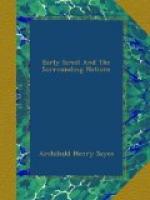I begin for thee with the palace of Sesostris (Ramses II.). Thou hast not set foot in it by force. Thou hast not eaten the fish in the brook of .... Thou hast not washed thyself in it. With thy permission I will remind thee of Huzana (near El-Arish); where is its fortress? Come, I pray thee, to the palace of the land of Uzi, of Sesostris Osymandyas in his victories, to Saz-el together with Absaqbu. I will inform thee of the land of Ainin (the Two Springs), the customs of which thou knowest not. The land of the lake of Nakhai and the land of Rehoburtha (Rehoboth, Gen. xxvi. 22) thou hast not seen since thou wast born, O Mohar. Rapih (the modern boundary between Egypt and Turkey) is widely extended. What is its wall like? It extends for a mile in the direction of Gaza.
[Footnote 18: By the use of French words and expressions Brugsch endeavours to represent the Canaanitish terms which the Egyptian writer has affectedly introduced into his work.]
IX
THE NEGATIVE CONFESSION OF THE EGYPTIANS
(Sir P. Le Page Renouf’s Translation)
(See page 186)
The 125th chapter of the Book of the Dead contains the confession which the soul of the dead man was required to make before Osiris and the forty-two divine judges of the dead, before he could be justified and admitted to the Paradise of Aalu:—
Said on arriving at the Hall of Righteousness, that N (the soul of the dead man) may be loosed from all the sins which he hath committed, and that he may look upon the divine countenances.
He saith:—Hail to thee, mighty God, lord of Righteousness!
I am come to thee, O my Lord! I have brought myself that I may look upon thy glory. I know thee, and I know the name of the forty-two gods who make their appearance with thee in the Hall of Righteousness; devouring those who harbour mischief and swallowing their blood, upon the day of the searching examination in the presence of Un-neferu (Osiris).
Verily “Thou of the Pair of Eyes, Lord of Righteousness,” is thy name.
Here am I; I am come to thee; I bring to thee Right and have put a stop to Wrong.
I am not a doer of wrong to men.
I am not one who slayeth his kindred.
I am not one who telleth lies instead of truth.
I am not conscious of treason.
I am not a doer of mischief.
I do not exact as the first-fruits of each day more work than should be done for me.
My name cometh not to the Bark of the god who is at the Helm.
I am not a transgressor against the God.
I am not a tale-bearer.
I am not a detractor.
I am not a doer of that which the gods abhor.
I hurt no servant with his master.
I cause no famine.
I cause not weeping.
I am not a murderer.




